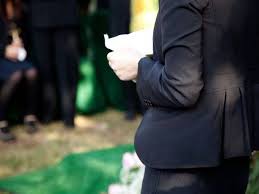A Reflection on Eulogies
A know-it-all student well advanced in middle life once told me in class that funerals are entirely for the benefit of the living, and not at all for the dead, an opinion in which, not for the first time, he displayed his--actually culpable--ignorance. A senior cleric of LCC, now in fact its head, once wrote a useful, hitherto unpublished paper, explaining how the Church's rites are properly structured to incorporate the Word and prayer, following a pattern apostolically mandated in 1 Tim 4:5.
Many would have a hard time wrapping their minds about the applicability of this Pauline injunction to a funeral, an occasion often marked by bitter grief among the mourners, especially those most closely related in terms of family and friendship to the departed.
Even so, all liturgical rites, and all private prayer, is properly encaptioned within a setting of thanksgiving; no service, no liturgy, no sacrament, no petition is exempt from the need to subsume it under a rendering of praise and thanks to God the Most Holy Trinity.
And a Christian funeral fitly provides a final consecration to that already consecrated thing, the body of a departed Christian made holy once in baptism, renewed in holiness by absolution, deepened in holiness through reception of the Lord's body and blood, refreshed in holiness through every blessed hearing of the Word, steeled in holiness as it has borne the cross during its pilgrimage through this vale of tears. In my middle years as a clergyman, when I looked after a vacancy for almost two years at the turn of the century, I had gotten to the point where I always traced the sign of the cross on the forehead of the departed as his or her coffin was about to be sealed for the last time. To make this gesture, the pastor must overcome universal human revulsion in the presence of death and especially in the close proximity of a corpse. But we are supposed to freak out over this horror, a reaction which shows that we register the effects of the fall. And the gesture attests Christ's own passage through and triumph over death. Once at the graveside, I would introduce the committal by telling the mourners that we were now to impart the Church's last earthly blessing to her child whose holy mortal remains were now being laid in the grave to await the last trumpet.
My first and only full-time parish belonged to a "liberal" district of the Missouri Synod, and the people almost universally desired an open communion practice, and this for the best of reasons: since the blessed sacrament is good for people, they should be free to go up and take it! And yet these dear folks loved the LW liturgies, weekly communion, and good, strong hymnody. One of the most striking feathers in their cap is that they were corporately aware that, unlike the many generic protestant churches that surrounded us, we didn't do eulogies. Oh yes, the pastor would incorporate salient data about the loved one in his homily, but the funeral ceremony--which in Western New York featured a devotion with homily at the wake, the service in the church, and the burial itself--was neither the time nor the place to "eulogise" the departed; the world does more than enough of that.
Alas, on one occasion during my stewardship of the vacancy referred to above, my resolve failed when, just before I led the coffin into the nave, the daughter of the departed slipped in the remark that I would surely have no problem with her son eulogising his grandmother at the end of the service. What to do in such a situation? As you might imagine, I caved, and the grandson, a young man of fine presence and gifted in speech, proceeded eloquently to undo the work the liturgy, hymnody, and homily had endeavoured to effect. And his mother later wrote me a nice letter thanking me for my "eulogy".
A former first vice-president of the Missouri Synod once told me he has stipulated in his will that no eulogy be delivered at his funeral. I intend to follow him in this directive: instead, I'd like the Dies irae to be sung from TLH, and--since LSB so cruelly starves me of much of the classical hymnody of the Anglosphere with which I grew up--I'd also like Newman's Praise to the holiest in the height to be sung. These decisions of the still living prelate and myself are fine and dandy as a stopgap measure. Best of all, though, would be to forbid eulogies, period.


